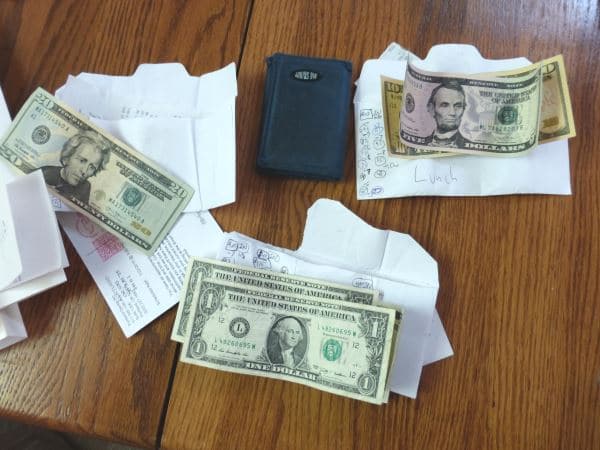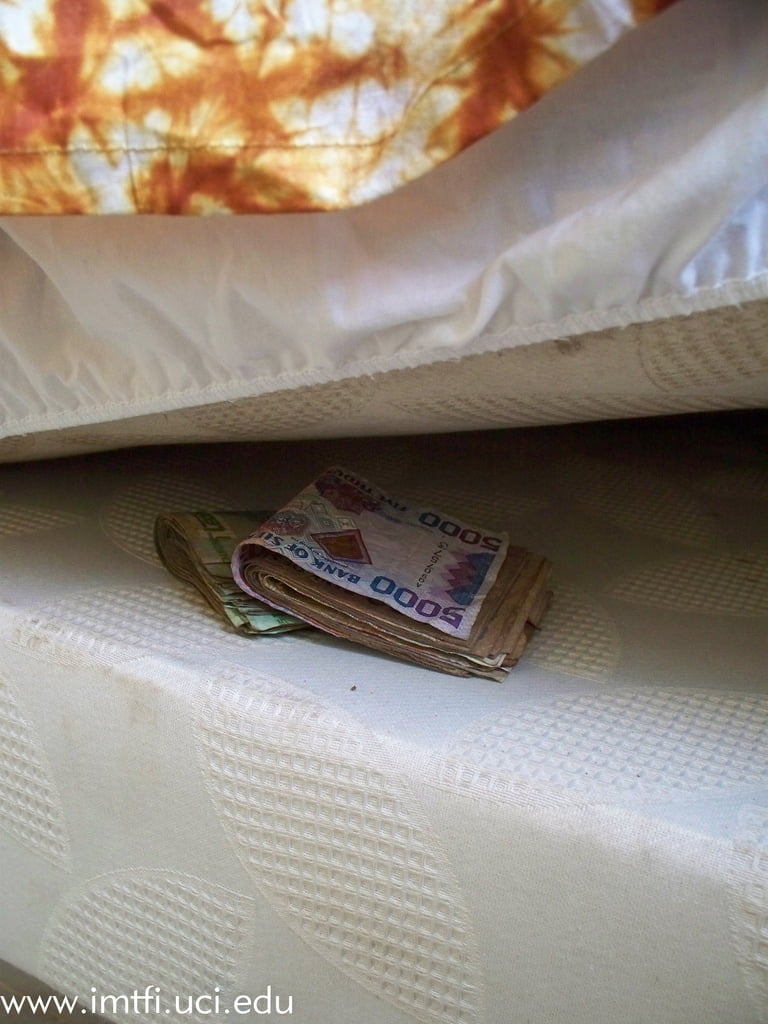For the past month, I have spent nothing but cash for all my expenses. (Bills were paid automatically.)
You can read about why I did this in greater detail, but more than anything, I basically just wanted to see what would happen. Would I spend more? Would I spend less? What would I learn along the way?
Well, now that the month is over, I can tell you all about what I learned, which was a lot. With a fair amount of surprise as well. Which is good, because the whole process was a giant pain.
Read on to see what I learned…
Table of Contents
The setup
Just saying that you want to pay cash is only the beginning. How will that manifest itself? As I always categorize what I spend, I decided upon using the “envelope system” this month. For each of my categories, I would put money in an envelope.

But this brought up an immediate raft of logistical questions:
Do I put the whole amount for each category in at once? I had $200 budgeted for groceries this month for example; would I carry around that $200 all month? Or if not, how much do I put in? And if I only put some in, how would it work when I overdraw the amount that’s physically in the envelope (but that I’ve still allocated for that category)?
Moreover, do I carry around every single category envelope? That’s a lot of envelopes for my poor bulging wallet, and if you add in all the cash in each envelope, even with a lean month, it would get out of hand pretty quickly.
I decided, more or less for pragmatic reasons, that I would only carry around the categories that I thought I would need throughout the day. Also, I decided that I didn’t want to be carrying around hundreds of dollars of cash, so I would partially load the envelopes, and replenish when necessary. As for what would happen when I ran out of money in the envelope (but not the budget), I would “borrow” from another envelope until I got home.

While pragmatic, this made the process of keeping things organized incredibly annoying. Also, these extra accounting steps meant that I couldn’t take advantage of one the big benefits of the envelope system, which is not needing to keep track of your spending elsewhere. (With a full envelope, if you have money in it, it’s fair game, and if you don’t, it’s not. Very simple.)
This was probably fine, as I would have wanted to keep track of things in my normal way (with a spreadsheet). For comparison purposes.
I believe that keeping a budget is just like giving yourself a raise. I’ve seen this happen too often to chalk it up to mere chance. But the conventional wisdom states that by using cash, you’ll feel it more, so you’ll be less likely to spend it. But since I’m already so hyper-aware of my spending, would it really matter if I was using cash or a debit card?
What I was sure of is that I made sure not to actively change any of my spending habits.
The process
There were lots of small things I noticed. Like how I had more coins in my life than ever before. (Which is not a bad thing.) I even got a roll of $1 coins for the first time in my life to pay for parking meters when circumstances required that I use them.

But coins aside, as the month rolled into gear, I didn’t feel any different. When I spent a $20 bill out at a restaurant, I would still record $20 in my spreadsheet under “Food Fun” (that’s my name for the category of all “non-essential” food spending). I didn’t notice any changes.
In fact, I started mentally drafting a post about how maybe spending cash doesn’t make much of a difference, especially if you’re already budgeting. I was willing to admit that my gut feeling that cash changes things might be off-base.
The surprise
About halfway through the month, I looked at my spreadsheet, saw how much I had spent in each category, and was startled with what I saw:
I was hundreds of dollars under budget.
This was so startling that it made me think that I had perhaps done my math wrong. But I hadn’t.
What I couldn’t figure out though, was why had this happened? By all rights, it felt like an average, representative month for me. Usual amounts of social time and alone time, busyness and downtime. It’s not like a was being a hermit. I went out, I did things. It was even a 31 day month.
But as spooky as it was, the numbers didn’t lie. I was spending less. And it was adding up.
The result
When the month ended, I was approximately $300 under budget. No joke. This means that just by dealing with cash and going through my normal month, that much extra is available now for saving, investing, or whatever I want to do with it.
Wow.
The future
Now this is a single data point, and I don’t want to extrapolate too much from this. To really establish causality, I’d need to do this again over the course of a few months.
But not right now. To be honest, I need a break. Not from budgeting, mind you, but it would be nice to not have to worry about making change for eight different piles of cash for a little bit.
But if you’re struggling, and you need to find extra money in your budget, I would highly recommend taking a month and spending only cash.
My thesis statement remains: With cash, you will spend less.
And if your experience is anything like mine, you won’t notice a thing. Just don’t ask me how it works, because I have no idea.

What do you think? Do you have any ideas how I spent less this month? Will you take the #cashonlymonth challenge to see?


